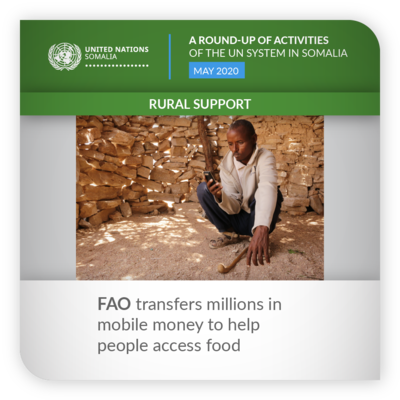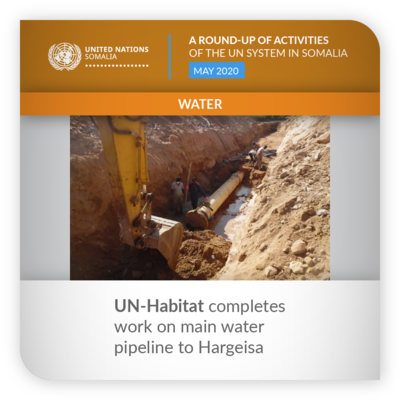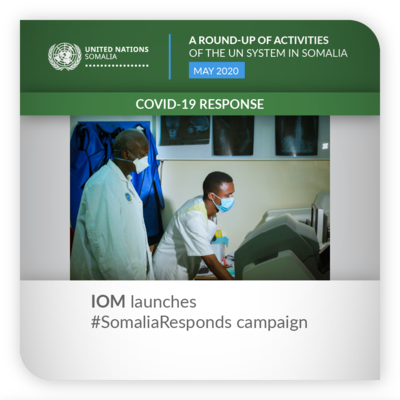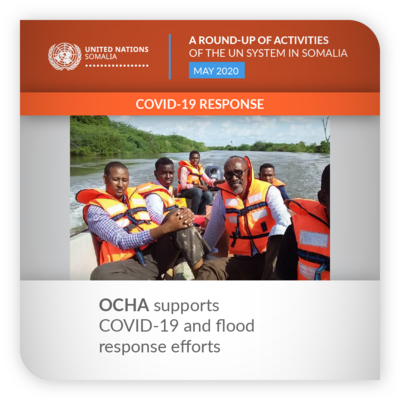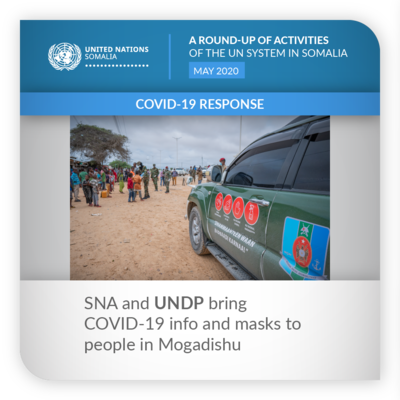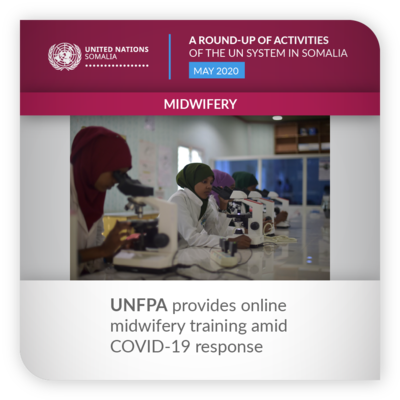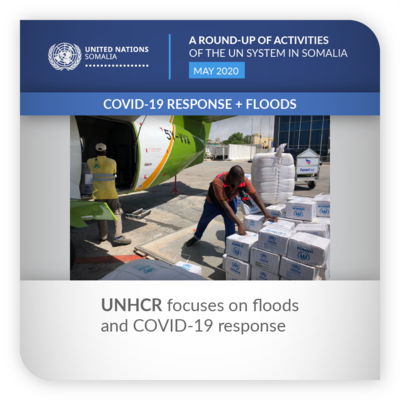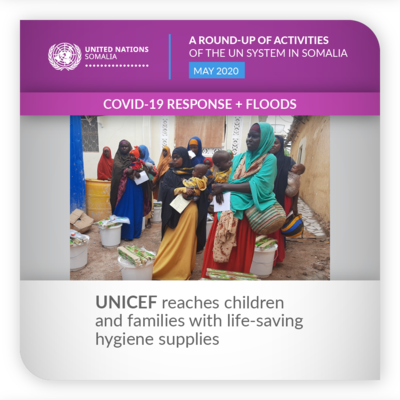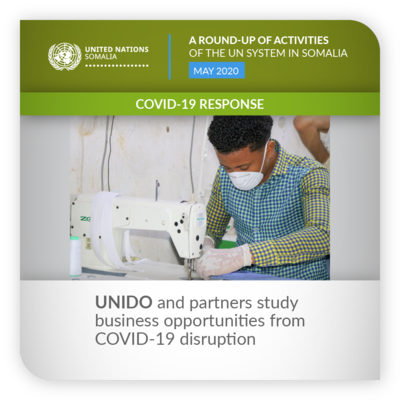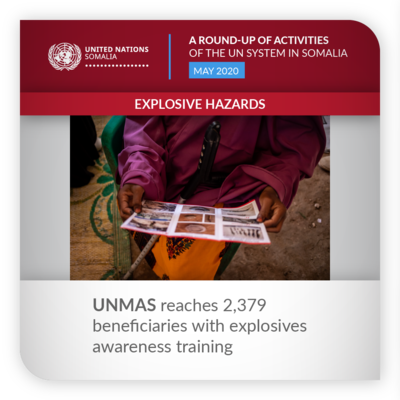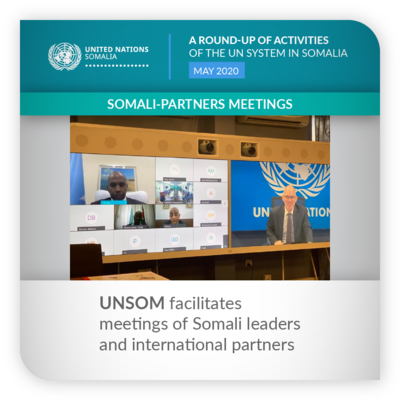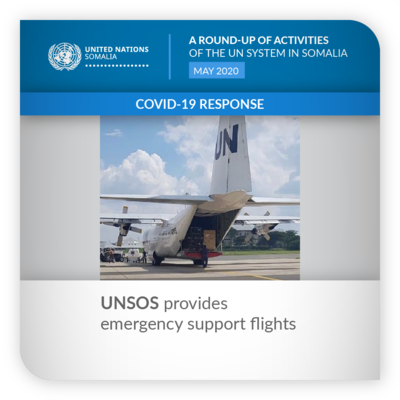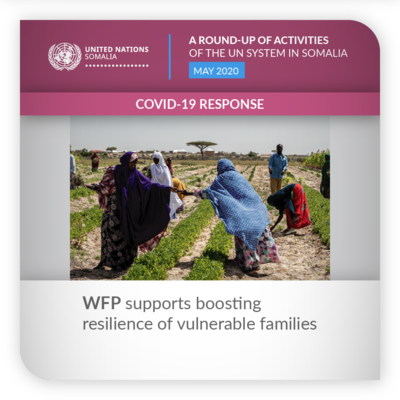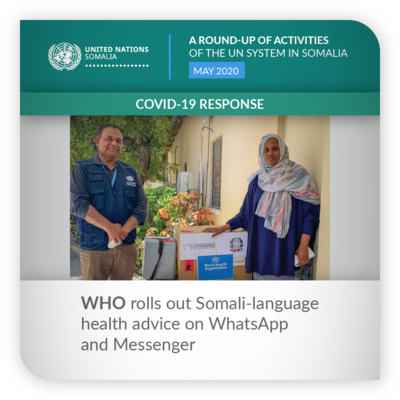A ROUND-UP OF ACTIVITIES OF THE UN SYSTEM IN SOMALIA IN MAY 2020
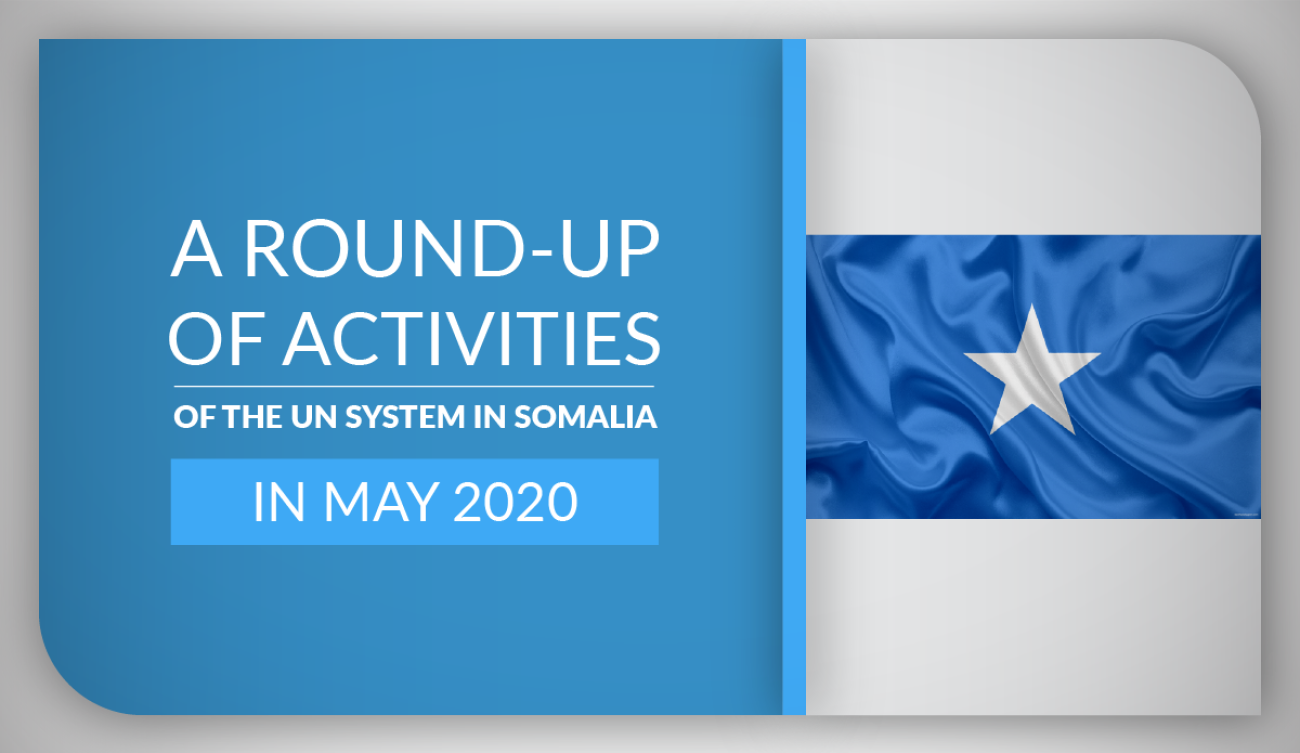
Highlights of the work of the UN system in Somalia.
|
|
Rural support | FAO transfers millions in mobile money to help people access food FAO has fully transitioned its cash assistance in Somalia to delivery via its Mobile Money system due to the emergence of COVID-19. Over the last two months, the UN agency has transferred more than $4 million dollars in mobile money to help 200,000 Somalis access food and other basic needs. FAO has already registered more than 350,000 Somali families - comprising more than 2.1 million people - in its growing Mobile Money platform. Funded by USAID, the Mobile Money system is an instant, safer and cost-effective way to distribute cash remotely to the most vulnerable people in rural areas, ensuring that aid money reaches the right people in a user-friendly way. Mobile Money has also proved successful in other emergencies, such as with the flooding in Belet Weyne in November 2019, where the system managed to transfer money to displaced people directly on their mobile phones. |
|
|
|
Water | UN-Habitat completes work on main water pipeline to Hargeisa UN-Habitat and its partners completed work on the main water transmission pipeline to Hargeisa City under the Hargeisa Urban Water Supply Upgrading Project (HWSUP). This involved finishing pressure testing of the entire 23 kilometre-long main transmission line between the Ged Deeble wellfield and the Hargeisa water reservoir. Also completed were flood and erosion protection measures for vulnerable sections along both the new and existing water pipelines – the work was carried out under challenging conditions of heavy rainfall and floods, as well as the COVID-19 pandemic. The next and final phase of the project will involve the supply and installation of electro-mechanical equipment at the new Ged Deeble pumping station which was built as part of the Project in 2019. Once completed, the water infrastructure upgrading project will increase the amount of water available for Hargeisa from nine million to 14.5 million litres per day, with the potential capacity to expand production to 24 million liters per day. |
|
|
|
COVID-19 response | IOM launches #SomaliaResponds campaign Decades of civil war have devastated Somalia’s health system. In Mogadishu, the De Martino Hospital, the country’s main public hospital designated for treating COVID-19 patients, does not have the necessary equipment to treat patients and keep healthcare workers safe. IOM in partnership with Somalia’s Ministry of Health and Human Services launched #SomaliaResponds, an individual giving campaign to raise funds for needed supplies to save lives and curb the spread of COVID-19 in Somalia. |
|
|
|
Humanitarian | OCHA supports COVID-19 and flood response efforts OCHA’s efforts centred on the COVID-19 response and flooding in the Federal Member State of Hirshabelle. For the former, the UN humanitarian agency continued to coordinate risk communication and community engagement efforts – this included radio announcements highlighting prevention measures, aired by partners on 21 radio stations and reaching millions across the country; some 25,000 posters on prevention measures disseminated in Mogadishu, and more than 30 posters on billboards installed around Somalia. On the latter, OCHA coordinated the rescue of 200 families who were marooned by floods in the Boore highlands, about 30 kilometres away from Belet Weyne town in Hirshabelle. The families had escaped from the low-lying Luqdheere and Bulo Raxo villages to Boore, which is more elevated, hoping that flood waters would not reach them. Instead, the water rose, marooning them for close to two weeks. |
|
|
|
COVID-19 response | SNA and UNDP bring COVID-19 info and masks to people in Mogadishu The Somali National Army took to the streets of Mogadishu with specially-trained army medics, loudspeakers and a COVID-19 awareness bus to bring life-saving information to camps for internally displaced persons (IDPs), markets and other crowded areas, with support from the Office of the Prime Minister and UNDP. Medics also handed out masks and conducted COVID-19 tests. |
|
|
|
Midwifery | UNFPA provides online midwifery training amid COVID-19 response UNFPA provided virtual training on family planning to tutors from 15 midwifery schools across Somalia. The training was part of the UN agency's continuing support to the country's Federal Government, through the Ministry of Health, for efforts to reduce unmet needs for birth spacing, consequently helping reduce the high maternal and new-born morbidity and mortality as the COVID-19 response continues. |
|
|
|
COVID-19 response + floods | UNHCR focuses on floods and COVID-19 response UNHCR activities were centred on the response to floods and the COVID-19 virus. To cushion families affected by heavy floods, UNHCR and partners aimed to reach close to 100,000 people with vital emergency kits. Emergency items such as jerry cans, soap, blankets, kitchen sets and plastic sheets have been airlifted from UNHCR warehouses in Dubai and Mogadishu and distributed to affected families in Baidoa, Luuq, Qardo and Beletweyne. At the same time, UNHCR action linked to the COVID-19-response included support to hospitals through the distribution of medical beds, oxygen cylinders, medical gloves and masks; sensitization campaigns that have so far reached more than 242,000 people; livelihood support to returnees and internally displaced persons; and, emergency shelter support. |
|
|
|
COVID-19 response + floods | UNICEF reaches children and families with life-saving hygiene supplies The COVID-19 pandemic has upended the lives of thousands of children and families in Somalia. To mitigate the spread of the virus' outbreak and to respond to flooding in Somalia, UNICEF has reached more than 870,000 people with critical hygiene supplies (including buckets, soap, water purification tablets and disinfectants) to empower and enable vulnerable Somali families to protect themselves. |
|
|
|
COVID-19 response | UNIDO and partners study business opportunities from COVID-19 disruption The federal Ministry of Commerce and Industry (MoCI), the Somalia Chamber of Commerce and Industry (SCCI) and UNIDO are working together to understand the possible implications that a global supply chain disruption could have on Somalia and identify business opportunities in the production of basic food and non-food goods, which are currently imported, but that could be instead substituted by a localized low-tech, low-capital and easy-to-start production. Through the network of the UNIDO-supported Enterprise Development Units (EDUs), located in Baidoa, Kismayo and Mogadishu, the UN agency is keen to promote such business opportunities. |
|
|
|
Explosive hazards | UNMAS reaches 2,379 beneficiaries with explosives awareness training Community-based risk education plays an important role in informing the public about explosive hazards and how to stay out of harm’s way. UNMAS community liaison officers delivered Explosive Ordnance Risk Education (EORE) to 2,379 beneficiaries in May. The goal of EORE is to educate the public about the threat of explosive hazards and reduce the number of unexploded ordnance (UXO) accidents in Somalia. |
|
|
|
Somali-partners meetings | UNSOM facilitates meetings of Somali leaders and international partners Amidst it support for Somalia’s COVID-19 response, UNSOM also continued with its other activities on the political, electoral and humanitarian fronts, among others. The UN Mission facilitated an online meeting of key international partners and Somali political actors, led by Prime Minister Hassan Ali Khaire, to coordinate and mobilize humanitarian aid during the recent flooding in the Puntland area of Qardho. It also facilitated meetings with regional leaders and international partners for an exchange of views on a range of issues affecting Somalia. |
|
|
|
COVID-19 response | UNSOS provides emergency support flights Through a special flight in coordination with UNDP and the UN Resident Coordinator’s Office, UNSOS transported two 350 KVA generators from Nairobi to Mogadishu, to be installed and used in Mogadishu hospitals. In coordination with the Office of the Prime Minister of Somalia, UNSOS flights have so far transported some 22 tonnes of medical equipment in support of different Federal Member States across Somalia, including Jubaland, Hirshabelle, and South West State. |
|
|
|
COVID-19 response | WFP supports boosting resilience of vulnerable families Strengthening the resilience of vulnerable Somali families in the time of COVID-19 is important to ensuring their food security. WFP provided cash-based and in-kind food assistance for more than 200,000 vulnerable people, enabling them to meet their food needs and, at the same time, protect their assets and sources of livelihoods. |
|
|
|
COVID-19 response | WHO rolls out Somali-language health advice on WhatsApp and Messenger WHO rolled out its Health Alert chatbot on WhatsApp (+41 7983 1892) and Facebook Messenger - in the Somali language - to help share information on COVID-19 prevention and self-care messages with the public. This is in addition to supporting the country's health authorities to establish and scale-up their testing capacity for the virus. |

